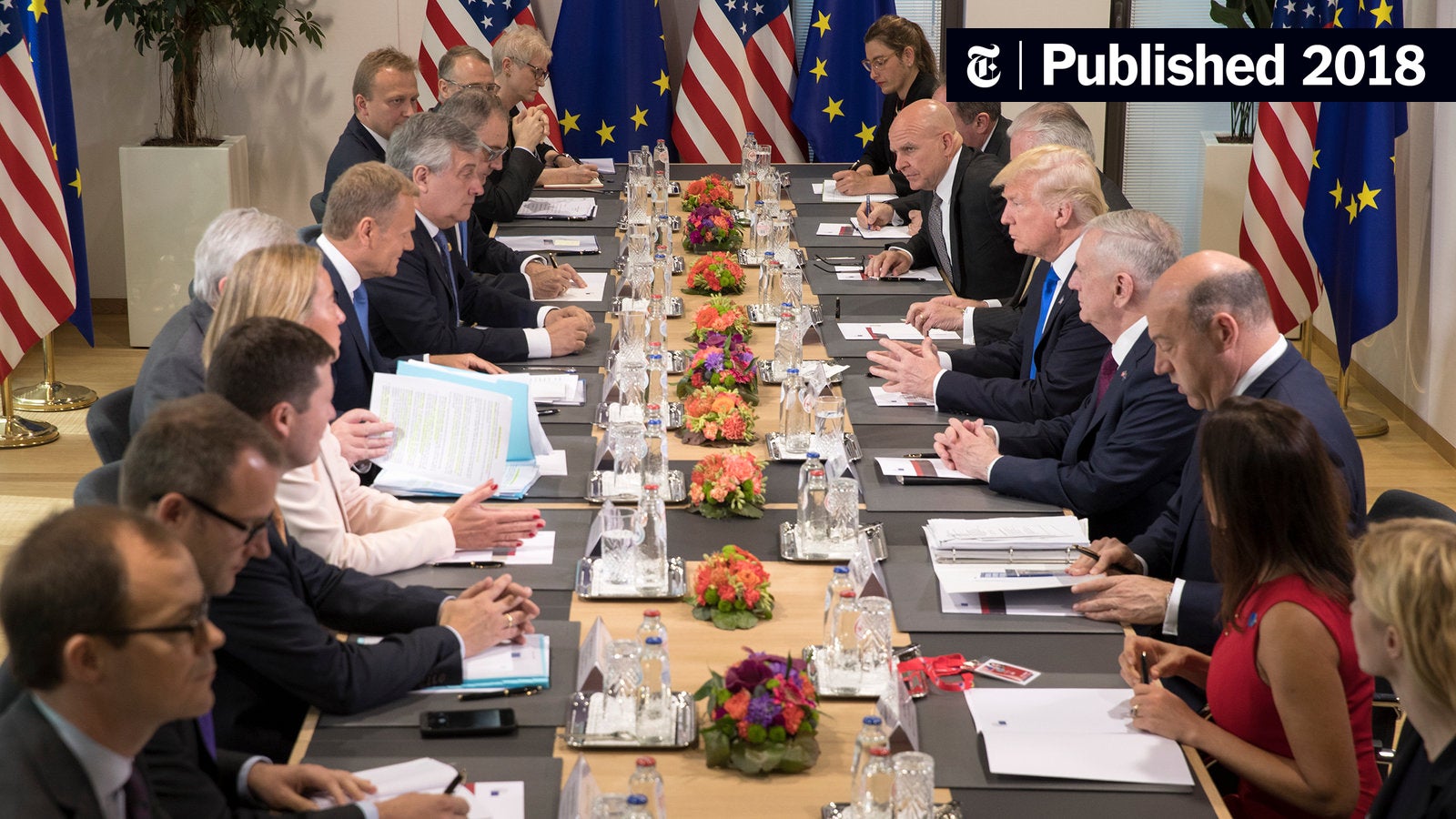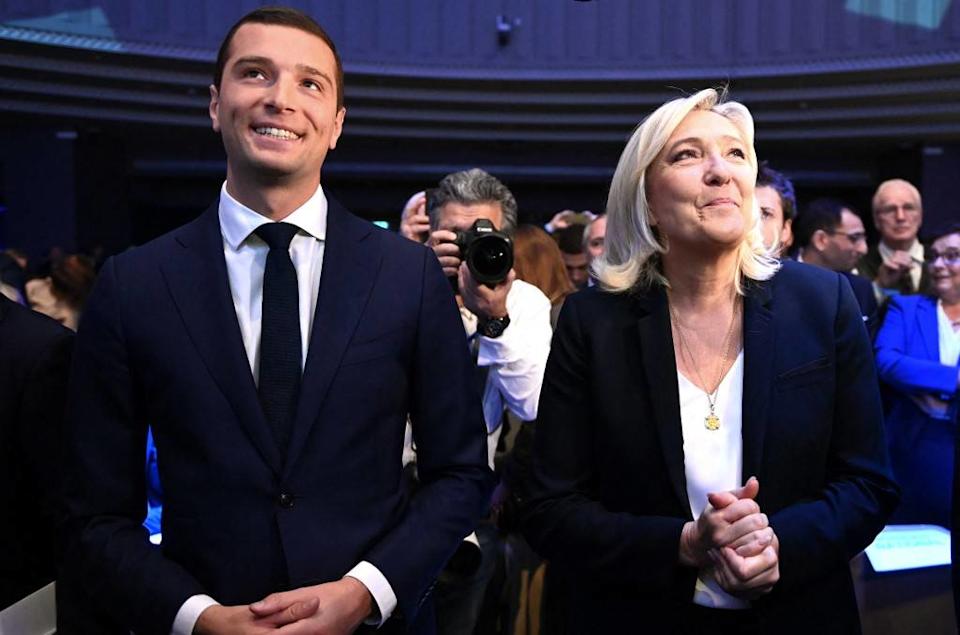Examining The Tensions Between Trump And Europe On Trade Issues

Table of Contents
Steel and Aluminum Tariffs: A Spark Igniting the Trade War
The Trump administration's imposition of steel and aluminum tariffs in 2018, justified on national security grounds, served as a major catalyst in escalating trade tensions with Europe. The EU viewed these tariffs as protectionist measures, violating international trade rules. This led to swift retaliatory measures from the European Union, targeting American goods like bourbon, motorcycles, and denim.
- Affected Industries: The tariffs significantly impacted steel and aluminum producers in both regions, leading to job losses in some areas and price increases for consumers. In the US, steelworkers initially celebrated, but the long-term effects were complex. In Europe, industries relying on imported steel and aluminum faced increased costs.
- Economic Impact: Precise quantification of economic losses remains debated, but studies suggest billions of dollars in lost trade and economic disruption on both sides of the Atlantic. The tariffs also fueled inflationary pressures.
- Legal Challenges: The EU challenged the tariffs at the World Trade Organization (WTO), arguing they were unjustified and violated WTO rules. While the WTO process is lengthy, it highlighted the legal complexities and challenges involved in resolving such disputes.
Airbus vs. Boeing Subsidy Dispute: A Long-Standing Conflict Exacerbated
The long-simmering dispute between Airbus and Boeing over government subsidies provided a second front in the trade war. The Trump administration leveraged this pre-existing WTO case, imposing retaliatory tariffs on European goods in response to what it deemed illegal subsidies provided to Airbus.
- WTO Dispute: The WTO had previously ruled against both Airbus and Boeing, finding instances of illegal subsidies. However, the Trump administration’s actions escalated the conflict, leading to further tit-for-tat tariffs.
- Global Impact: The dispute impacted global supply chains, particularly in the aerospace industry, creating uncertainty and disrupting production. Consumers worldwide also faced potential price increases on aircraft and related products.
- Negotiations: While the original WTO ruling remains, ongoing negotiations between the US and the EU aim to find a sustainable solution to the dispute and avoid further escalation.
Agricultural Disputes: Soybeans, Dairy, and Beyond
Trade tensions extended beyond industrial goods to encompass the agricultural sector. European tariffs on American agricultural products, particularly soybeans and dairy, caused significant hardship for American farmers. These measures were often retaliatory responses to the steel and aluminum tariffs.
- Specific Products: Soybeans, a major American export, faced significant tariff barriers in Europe, causing price drops and impacting farm incomes. Similarly, the dairy sector experienced disruptions due to retaliatory measures.
- Rural Communities: The agricultural disputes had a profound impact on rural communities in the US, already facing economic challenges. Farm incomes declined, leading to economic hardship and uncertainty.
- Subsidies and Trade Barriers: The conflict highlighted the role of agricultural subsidies and trade barriers in exacerbating trade tensions. Both the US and EU heavily subsidize their agricultural sectors, leading to accusations of unfair competition.
The Impact on the Transatlantic Relationship: Beyond Economics
The trade disputes under Trump had far-reaching consequences that extended beyond economic considerations. They significantly strained the political relationship between the US and Europe, impacting cooperation on other fronts.
- Strained Diplomatic Relations: The frequent clashes and retaliatory measures created a climate of distrust and animosity, impacting other areas of cooperation.
- NATO and International Alliances: The trade tensions raised questions about the future of transatlantic alliances like NATO, as trust and cooperation were visibly affected.
- Future Cooperation: The damage to the transatlantic relationship caused by these trade disputes may take years to repair, potentially hindering future cooperation on global issues.
Understanding and Addressing the Legacy of Trump-Europe Trade Issues
The Trump administration's trade policies left a lasting mark on the relationship between the US and Europe. The steel and aluminum tariffs, the Airbus-Boeing dispute, and agricultural conflicts created significant economic disruption and severely strained political relations. Understanding the full impact of these “Trump and Europe trade issues” requires ongoing analysis. The long-term consequences for global trade and the transatlantic partnership are still unfolding. We must continue researching the ongoing implications of these trade disputes and their long-term effects on global trade, analyzing Trump's trade legacy and the future of EU-US trade relations, and exploring strategies for resolving trade conflicts and building a more stable and cooperative future for transatlantic trade. The need for continued analysis and discussion of Trump and Europe trade issues remains paramount to shaping a healthier future of global commerce.

Featured Posts
-
 Avrupa Borsalari Buguenkue Kapanis Ve Piyasa Degerlendirmesi
May 25, 2025
Avrupa Borsalari Buguenkue Kapanis Ve Piyasa Degerlendirmesi
May 25, 2025 -
 Escape To The Country Embracing A Slower Pace Of Life
May 25, 2025
Escape To The Country Embracing A Slower Pace Of Life
May 25, 2025 -
 Another Parisian Court For Queen Wen
May 25, 2025
Another Parisian Court For Queen Wen
May 25, 2025 -
 Jordan Bardella And The 2027 French Presidential Race
May 25, 2025
Jordan Bardella And The 2027 French Presidential Race
May 25, 2025 -
 Apple Stock And Trump Tariffs A Look At Buffetts Investment Strategy
May 25, 2025
Apple Stock And Trump Tariffs A Look At Buffetts Investment Strategy
May 25, 2025
